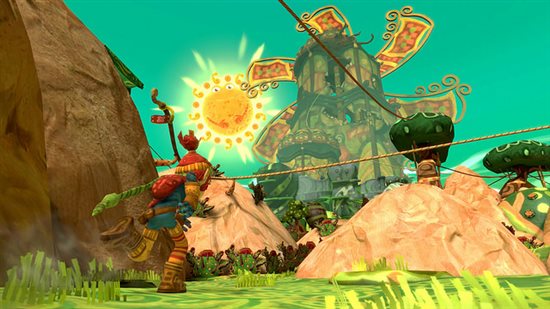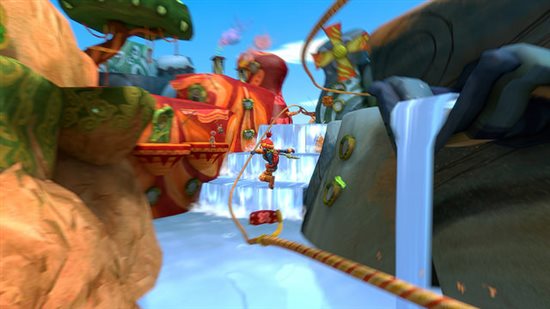Publisher: Loot Entertainment
Developer: Mimimi/Loot Entertainment
Medium: Digital
Players: 1
Online: No
ESRB: E10+
A word to the wise: if and when you play The Last Tinker: City of Colors, have a pair of sunglasses on hand. Or have your contrast or gamma or brightness or whatever turned way, waaaay down. Or…well, do whatever you can to dim the screen a little, because the game’s default setting is, apparently, “hideous eyesore”. (Note: there’s also a color-blind version. This does not look substantially better, though the colors are more puke-inspired than eye-searing, so…progress?)
And once you have muted The Last Tinker’s colors, what then? Does that make it worth playing? In a nutshell: yep.
See, this game is a throwback to Ratchet & Clank, to Jak & Daxter, to Sly Cooper: to all those excellent 3D platformers that, other than Knack and maybe Rayman, don’t seem to appear much on non-Nintendo platforms anymore. You’ve got your animal character with an attitude (in this case, a simian named Koru), you’ve got a sidekick (a pig-sheep-hybrid-thingy called Tap), you’ve got a couple of different worlds to explore — basically, it hews very closely to the formula established by those games, and it does that extremely well. Throw in hint of de Blob, with the heavy emphasis that color plays in The Last Tinker’s storyline, and Tearaway, with the use of papercraft in some of the environments, and you’ve got a pretty good idea of what you’re in for here.
Admittedly, this seems to be a little more child-oriented than any of those games. If that wasn’t obvious from the color palette — that, again, looks like technicolor rainbow vomit — then it should be from the controls. You can’t jump, which is…well, kind of crazy when you think about it, since this is a platformer we’re talking about. As you can imagine, not needing to press the jump button makes things significantly easier than in any of those aforementioned predecessors. (In fairness, as you progress through the game, timing your forward motion matters a little more, but it still doesn’t quite have the same feel.)
Despite that — and, not to drive this into the ground, despite that godawful color scheme — The Last Tinker is still a wonderful game. It may not stray very far from its influences, but considering how well it borrows from them, it hardly needs to. This is an adorable, easy-to-love game, and it’s well worth a play.



